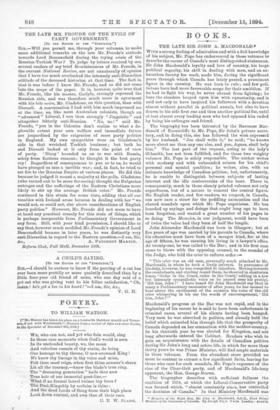THE LATE MR. FROUDE ON THE EVILS OF PARTY GOVERNMENT.
[To TIVI EDITOR OF TK "SPECTATOR."] Sin,--Will you permit me, through your columns, to make some additional remarks on the late Mr. Froude's attitude towards Lord Beaconsfield during the trying crisis of the Russian-Turkish War To judge by letters received by me, several readers of my brief Reminiscences of Mr. Fronde, in the current National Reziew, are not unnaturally of opinion that I have too much overlooked the intensely anti-Disraelian attitude of the deceased historian at that time. The fact is, that it was before I knew Mr. Fronde, and so did not come into the scope of the paper. It is, however, quite true that Mr. Froude, like his master, Carlyle, strongly espoused the Russian side, and was therefore much more in agreement with his bete noire, Mr. Gladstone, on this question, than with Disraeli. A conversation I had with him much impressed me at the time, as, like most Australian colonists, though an "advanced" Liberal, I was then strongly " Jingoistic " and altogether bitterly anti. Russian. "No, no!" said Mr. Froude, "you in the Colonies don't realise to what a de- plorable extent your own welfare and immediate future are jeopardised by the exigencies of mere party politics in England. My own sympathies were on Gladstone's side in that wretched Turkish business ; but both he and Disraeli looked at it only from the point of view of party. 'Dizzy' hounded us on to war with Russia, solely from factious reasons ; he thought it the best party cry! Regardless of consequences to you or to us, he would have plunged us into a terrible war ; and, in fact, he tried to set fire to the Russian Empire at various places. He did this because he judged it meant a majority at the polls. Gladstone (who turned out to be more far-seeing) thought the Bulgarian outrages and the sufferings of the Eastern Christians more likely to stir up the average British voter." Mr. Fronde continued in this strain for some time, adding that all our troubles with Ireland arose because in dealing with her "we would not, or could not, rise above considerations of English party polities." However, Mr. Froude did not seem to have at hand any practical remedy for this state of things, which is perhaps inseparable from Parliamentary Government in any form. Still, with your kind permission, I should like to say that, however much modified Mr. Froude's opinion of Lord Beaconsfield became in later years, he was distinctly very anti-Disraelian in regard to the Eastern question.—I am, Sir,








































 Previous page
Previous page